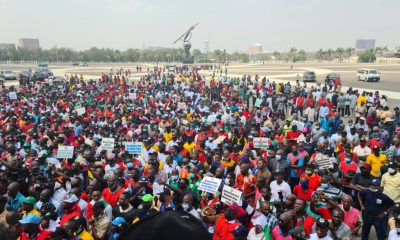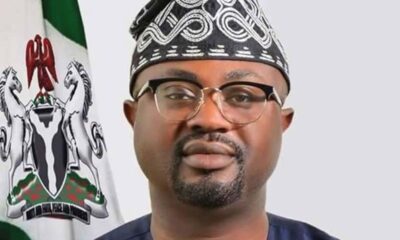News
Cash Transfer: FG disqualifies Nigerians without NIN, BVN, as CBN begins payment

Cash Transfer: FG disqualifies Nigerians without NIN, BVN, as CBN begins payment
The Federal Government is now in the process of reviewing and expanding the National Social Register to accommodate pensioners and ex-servicemen under its Conditional Cash Transfer scheme, The PUNCH reports.
It is also removing beneficiaries who have excited the poverty line.
Saturday PUNCH gathered that the government was also taking out dead beneficiaries from the register and would disqualify those without National Identification Numbers and Bank Verification Numbers.
It was further gathered that payments would be made directly to the beneficiaries by the Central Bank of Nigeria and not through consultants, as the first batch of bulk payments would begin next week for five million households.
The Conditional Cash Transfer scheme is part of the National Social Investment Programme of the Federal Government, which is a project created to change the lives of millions of Nigerians living in extreme poverty, upgrade their standards of living and improve the economy.
In commemoration of the 2023 International Day for the Eradication of Poverty on Tuesday in Abuja, President Bola Tinubu launched the disbursement of N25,000 to 15 million households for three months as a social safety net intervention.
The aim is to mitigate the impact of the recent fuel subsidy removal and help eradicate poverty across the country.
Providing further details on the initiative in response to inquiries by Saturday PUNCH, the Special Adviser on Media and Publicity to the Minister of Humanitarian Affairs and Poverty Alleviation, Rasheed Olanrewaju, stated that the cash transfer scheme had been reviewed and expanded.
Asked if the Federal Government would use the old register used by the former President Muhammadu Buhari administration to transfer the money, he stated, “We are using a verified expanded register that has pensioners and veterans, as well as other vulnerable persons who were not captured.”
Confirming the position of the minister’s media aide, the National Communications Manager, National Social Investment Programme Agency, Jamaldeen Kabir, stated that beneficiaries who had exited the poverty line were being removed from the register.
Kabir said, “What he (Olanrewaju) told you is very correct, because the register is being expanded. First of all, it has to be verified so that those who are out of the poverty line will be removed from the old register.
“Those in the register, are they still within the poverty line or have they exited the line? The expansion will also include the wives of fallen heroes and pensioners.”
On when the cash transfer would begin, Olanrewaju stated that though bulk payments would commence from next week, some of those who had been verified had already started receiving payment alerts.
“The cash transfer (scheme) has been launched and once a household is verified, they get paid. The batches begin this month, next week to be precise; however, verified people have started receiving alerts,” he stated.
Also commenting on when the cash transfer would begin, Kabir said, “Actually, when the programme was launched at the Presidential Villa three days ago, some beneficiaries were presented with some cheques.
READ ALSO:
-
Police arrest husband for allegedly killing wife in Borno
-
It’s time to draft new constitution, Anyaoku tells Tinubu
-
Argentina World Cup winner handed two-year ban for doping
“So, before this month ends, the beneficiaries in the first phase will receive theirs, and this phase caters to five million households. So, we are expecting those five million households to receive money in the months of October, November and December,” Olanrewaju added.
On how many ghost recipients had been discovered, the minister’s aide stated that a lot of measures had been put in place to make the scheme credible, such as the introduction of the NIN and BVN.
“They may not be ghosts, but we have put in place many controls to make the process credible and clean. First, we looked for the NIN and BVN to match with in-person verification and biometrics. The process is from the CBN to the beneficiaries; there are no middlemen,” Olanrewaju stated.
Asked to state the number of dead recipients, he replied, “We have struck off many names following the verification. The final figure will be out in weeks; it may run into millions.
“Some are dead; some are no longer in that category (of the poor) and some could not be identified at locations given, so wait till we get the compilation ready,” he added.
Asked to state those involved in identity theft, he said, “All these will be determined when the final report is out. For now, we will pay those fully verified and the names will be pasted in communities.
“Fifteen million households amount to about 62 million individuals, with an average of five persons per household.”
The humanitarian ministry stated that the determination of the Federal Government to eradicate poverty was in line with the President’s Renewed Hope Agenda, which has poverty eradication, food security, economic growth and job creation as priorities.
At the launch of the cash transfer scheme on Tuesday, Tinubu, who was represented by the Secretary to the Government of the Federation, Senator George Akume, enumerated various steps his administration had taken to ameliorate poverty in the country.
These, according to the President, include providing the policy framework and road map for poverty alleviation, developing humanitarian response and expanding the National Social Register to capture Nigerians living below $1.95 per day.
Other steps include restructuring of the National Social Investment Programme and repositioning it for quick and efficient delivery that is transparent, as well as partnering with the World Bank Group and other development partners to implement conditional cash transfers and business grants, among others.
READ ALSO:
- Reprieve, Tinubu orders payment of upheld four-month salaries to varsity lecturers
-
Over 4,100 Palestinians killed, 13,000 injured in Israeli strikes
-
Woman crushed to death by falling 40ft container in Anambra
The ministry stated that the government was also investing N100bn in the purchase of 3,000 units of 20-seater Compressed Natural Gas-powered buses for cheaper transportation.
It further stated that there was an investment of N200bn to cultivate 500,000 hectares of farmland to improve food security.
The ministry added, “The release of 2,000 metric tonnes of grains from the strategic grains reserves to households across the 36 states and the Federal Capital Territory. The distribution of 225,000 metric tonnes of fertilisers and seedlings to farmers, who are committed to the nation’s food security.
“The release of N75bn to support 100,000 small and medium enterprises and start-ups. Renewed Hope Shelter Programme for the poor, refugees and internally displaced persons targeted at one million households.
“Business grants and loans for vulnerable market women, farmers and traders to expand their business, targeted at two million beneficiaries, among other interventions from various ministries through a multi-sectoral approach.”
The Minister of Humanitarian Affairs and Poverty Alleviation, Betta Edu, recently stated that all stakeholders, including the private sector players, development partners and other nations, should support Nigeria in its drive to eliminate poverty.
She stated, “The cardinal goal of President Bola Ahmed Tinubu’s administration is to give the poor and vulnerable Nigerians a new breath of hope, which is also in line with the SDG target”
“President Bola Ahmed Tinubu will not relent until vulnerable Nigerians are completely pulled out of poverty by 2030.”
Edu said the conditional cash transfer was a proven way to alleviate poverty, as it would give households the financial support to start micro and small enterprises, provide basic health care and food, keep their children in school and attend to the immediate needs of the households.
She stated, “Mr. President, during the October 1, 2023, national broadcast, announced this intervention; we have gone through a thorough and rigorous process of verification for the National Social Register, giving us the lead way to begin payments.
“The beneficiaries are drawn from across all states in the country plus the Federal Capital Territory and it is being done in a transparent manner that is traceable and verifiable.
“Beyond this, the government will be providing low-cost shelter for the poor and internally displaced persons as a form of providing that cover for them.
“Several other interventions, including the rural vocational skills intervention, will be carried out on a country-wide scale. All of these are targeted at the various dimensions of poverty across the country.”
Cash Transfer: FG disqualifies Nigerians without NIN, BVN, as CBN begins payment
News
Drama as Delta workers boo Gov Oborevwori over minimum wage
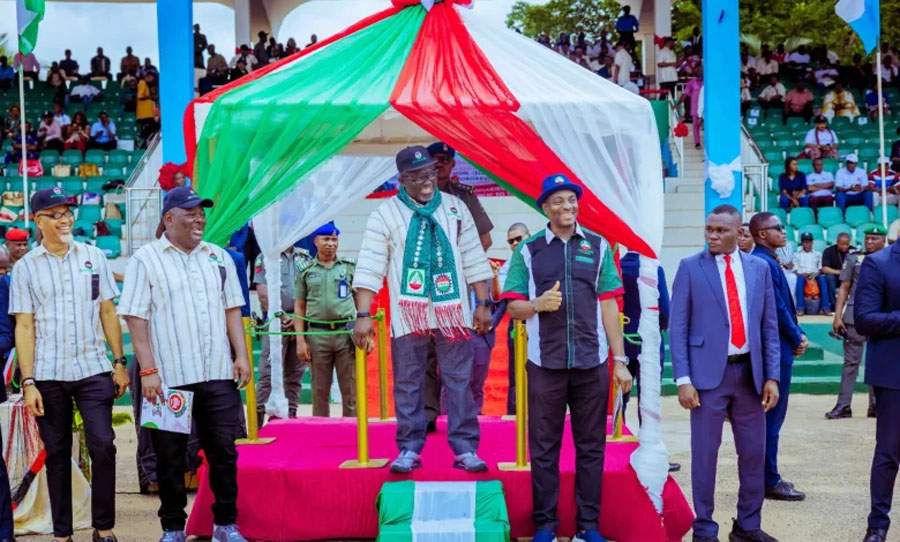
Drama as Delta workers boo Gov Oborevwori over minimum wage
Delta State workers expressed their disappointment with Governor Sheriff Oborevwori on Wednesday as he failed to address the issue of minimum wage during the 2024 May Day celebration in Asaba, themed “People First.”
Anticipating news on the minimum wage, the workers were disheartened when the Governor concluded his speech without mentioning it, prompting them to chant, “no, no, no, we no gree, pay us our minimum wage.”
Despite the interruption, Oborevwori stood firm, stating, “Listen to me, listen to me, calm down, calm down, you cannot cajole me.”
The celebration, which included a march past by various affiliate unions, turned sour due to the workers’ dissatisfaction with the governor’s silence on the wage issue.
READ ALSO:
- Neighbour, son beat mother of four to death in Edo
- London sword attack leaves British-Nigerian teenager dead
- Lagos uncovers 86 rooms under Ikoyi bridge where tenants pay N250,000 rent
According to a union leader, previous attempts to address the matter with the Governor proved futile.
In response, Governor Oborevwori announced plans to establish a committee to address the workers’ demand for salary increases amidst prevailing economic challenges. He praised the workers for their support and assured them of his administration’s commitment to workers’ welfare.
“I have listened attentively to your requests, and I have taken note of them; they are, no doubt, legitimate demands and as a responsible government, I will deliberate with my team on how best to address them within the limits of the resources available to us,” he affirmed.
In a statement delivered by Comrade Goodluck Ofobruku, the State Chairman of the Nigeria Labour Congress, NLC, he emphasized the importance of politicians keeping their promises, stating, “We want promise keeper politicians because, as workers, we keep records of promises.”
Drama as Delta workers boo Gov Oborevwori over minimum wage
News
Two million bank accounts closed over BVN, NIN, others

Two million bank accounts closed over BVN, NIN, others
Commercial banks in Nigeria closed 2.021 million bank accounts in the first quarter of 2024, Q1’24, to clean their books of questionable accounts and comply with regulatory orders on the linkage of bank accounts to the National Identity Number, NIN.
This is contained in a report by the Nigerian Interbank Settlement System, NIBSS, which also indicated that the number of inactive bank accounts grew month-on-month, MoM, by four million or 2.0 per cent to 19.7 million in March 2024 from 19.3 million in the previous month, February.
A bank account is classified inactive when it records zero transactions including deposits, withdrawals, transfers or point-of-sale transactions for six months.
READ ALSO:
- Senate insists on 16 years as requirement for tertiary institution admission in Nigeria
- Minimum wage: Labour threatens nationwide strike by end of May
- UCL: Füllkrug gives Dortmund 1-0 first-leg win over PSG
However, details of the “Industry Bank Account Database”, a monthly data reported by banks, and compiled by the Nigerian Interbank Settlement System, NIBSS, also indicated that the number of active bank accounts grew by 6.62 million or 3.0 per cent to 219.64 million from 213.02 million in February.
Recall that in December 2023, the CBN issued a directive to all commercial banks in the country to restrict tier-1 accounts without proper Biometric Verification Number, BVN, and National Identity Number, NIN, that are not linked by Thursday, March 1st, 2024.
According to NIBSS data on BVN enrollment count, 61.6 million Nigerians have BVN as of April 2024.
Two million bank accounts closed over BVN, NIN, others
News
Senate insists on 16 years as requirement for tertiary institution admission in Nigeria
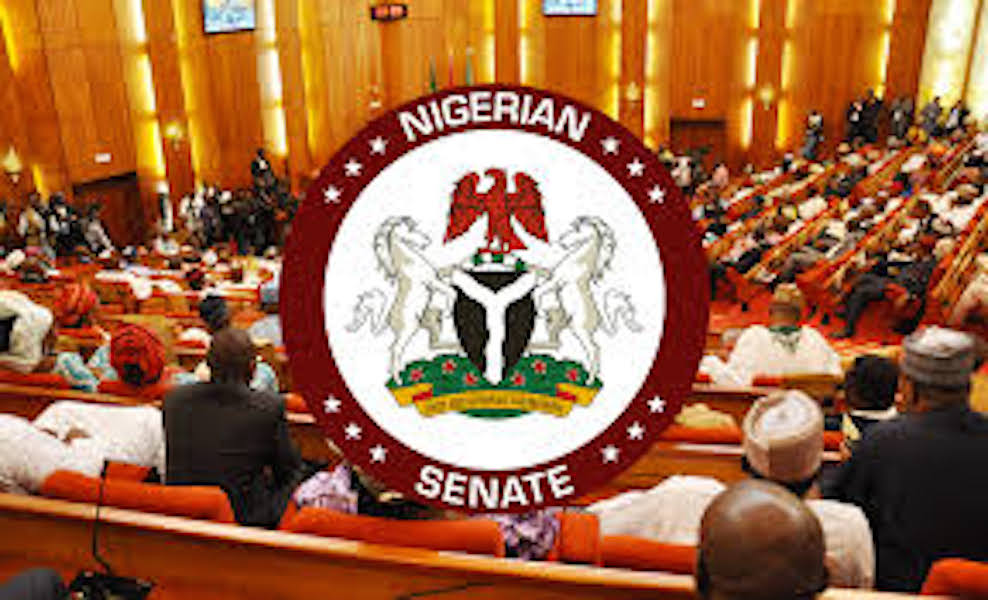
Senate insists on 16 years as requirement for tertiary institution admission in Nigeria
The Nigerian Senate has moved to clarify recent discussions regarding the minimum age requirement for admission into tertiary institutions.
The red chamber assured Nigerians that the current age requirement of 16 years has not been altered and that recent comments suggesting an increase to 18 years were personal opinions.
READ ALSO:
- Minimum wage: Labour threatens nationwide strike by end of May
- UCL: Füllkrug gives Dortmund 1-0 first-leg win over PSG
- Adopt quarterly exchange rate for Customs duty, economist advises FG
Chairman of the Senate Committee on Media and Public Affairs, Adeyemi Adaramodu, emphasised that any changes to the age requirement would require legislative action following due process.
Adaramodu explained in an interview with journalists that comments made by the Minister of Education, Prof. Tahir Mamman, about increasing the minimum age limit were not legally binding but rather personal opinions.
The Minister of Education had previously hinted at plans to review and raise the minimum age for admission into tertiary institutions to 18 years.
Senate insists on 16 years as requirement for tertiary institution admission in Nigeria
-

 metro2 days ago
metro2 days agoLabour Day: Nigerian workers are dedicated, resilient, says NURTW leader
-

 Education3 days ago
Education3 days agoBREAKING: JAMB releases 2024 UTME results
-
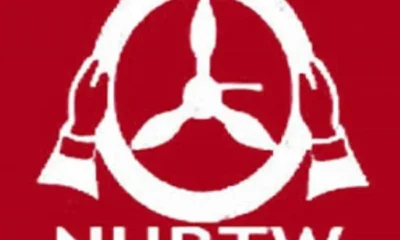
 Auto20 hours ago
Auto20 hours agoAppeal court takes over NURTW case as NIC withdraws
-

 metro5 hours ago
metro5 hours agoSecurity forces, vigilantes arrest kidnapper terrorising communities in Kogi
-
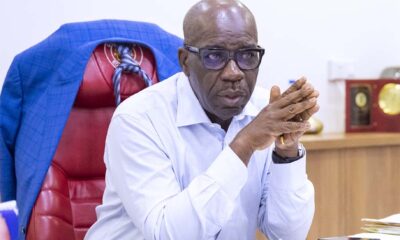
 Uncategorized3 days ago
Uncategorized3 days agoJust in: Edo govt announces N70,000 minimum wage for workers starting May 1
-
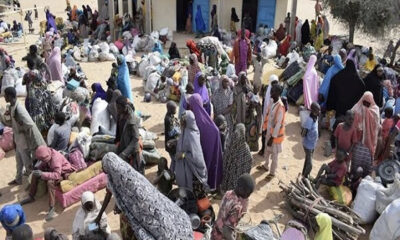
 News2 days ago
News2 days agoFG set to repatriate 20,000 Nigerians from Chad, Cameroon
-
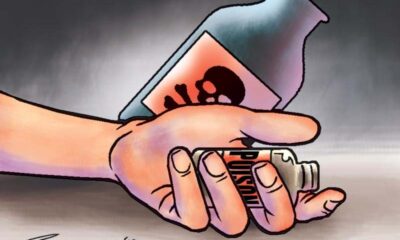
 metro2 days ago
metro2 days agoWoman arrested in Ogun after husband commits suicide
-

 Sports3 days ago
Sports3 days agoFinidi George appointed Super Eagles head coach







